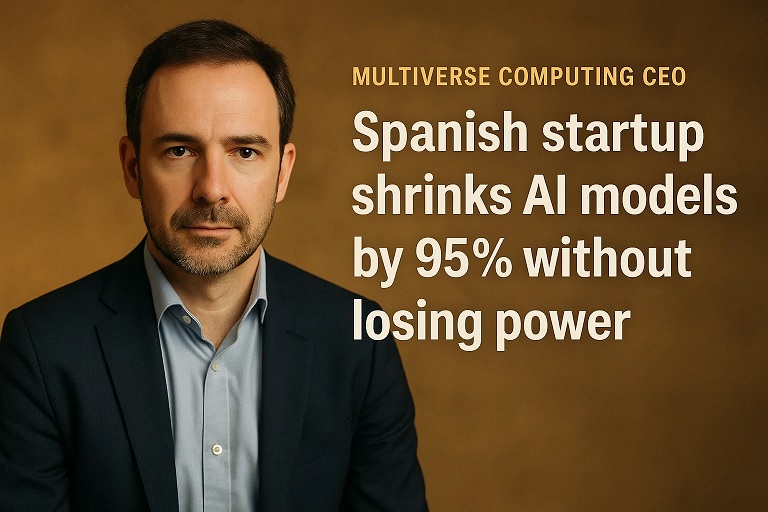Spanish Startup Shrinks AI Models by 95% Without Losing Power: A Quantum Leap in Efficiency
By Editorial Desk | August 22, 2025
Spanish startup Multiverse Computing has achieved a groundbreaking feat in artificial intelligence, unveiling AI models that are up to 95% smaller than their counterparts while maintaining near-identical performance. Announced on August 12, 2025, their proprietary CompactifAI technology, rooted in quantum-inspired tensor networks, powers models like SuperFly and ChickBrain, challenging the industry’s trend toward ever-larger language models. Backed by a €189 million ($217 million) funding round, Multiverse’s innovation promises to revolutionize edge computing, enhance privacy, and slash costs, positioning Spain as a leader in efficient AI. This article provides a detailed analysis of Multiverse’s breakthrough, its implications, and supporting data in tables, concluding with answers to frequently asked questions.
Overview of Multiverse Computing’s Breakthrough
Based in San Sebastian, Multiverse Computing has developed CompactifAI, a compression technology that reduces large language models (LLMs) by up to 95% with only 2–3% precision loss. Their flagship models, SuperFly (for resource-constrained devices) and ChickBrain (3.2 billion parameters, based on Meta’s Llama 3.1 8B), enable AI to run on edge devices like smartphones, drones, and appliances without relying on cloud infrastructure. The June 2025 funding round, led by Bullhound Capital and supported by HP Tech Ventures, Toshiba, and others, has elevated Multiverse to Spain’s largest AI startup, with over 160 patents and 100 global clients, including Iberdrola and Bosch. This development aligns with Europe’s push for AI sovereignty and sustainable innovation.
Historical Context: The AI Size Race and Europe’s Role
The AI industry has long prioritized larger models, with giants like OpenAI’s GPT-4 (over 1 trillion parameters) and Meta’s Llama 3.1 requiring massive cloud-based infrastructure. This approach drives up costs—data centers consumed 1.5% of global electricity in 2024, projected to hit 3% by 2030—and limits deployment in low-resource settings. Multiverse’s quantum-inspired approach, developed since its 2019 founding, disrupts this paradigm by leveraging tensor networks, a mathematical framework from quantum physics, to compress models without sacrificing accuracy.
Spain’s tech ecosystem, bolstered by €2.2 billion in startup funding in 2024 and a 184% increase in Q1 2025 investments, has fueled Multiverse’s rise. The Spanish government’s AI Strategy 2024 and the Barcelona Supercomputing Center’s €62 million AI Factory initiative further underscore Spain’s ambition to lead in ethical, efficient AI. Multiverse’s success builds on this momentum, challenging U.S. and Chinese dominance in the $1 trillion AI market.
Detailed Breakdown of the Technology and Impact
CompactifAI Technology
- Mechanism: Uses tensor networks to eliminate billions of spurious correlations in neural networks, achieving up to 95% size reduction.
- Models:
- SuperFly: Ultra-compressed for edge devices (e.g., smart appliances, Raspberry Pi), enabling offline voice and command processing.
- ChickBrain: 3.2 billion parameters, derived from Llama 3.1 8B, optimized for enterprise and industrial applications.
- Performance: Retains 97–98% accuracy of original LLMs, with 4x–12x faster inference and 50–80% lower costs.
Key Benefits
- Edge Computing: Enables AI on devices with limited resources, reducing reliance on cloud data centers.
- Privacy: Local processing keeps data on-device, addressing regulatory concerns (e.g., GDPR).
- Cost Efficiency: Cuts compute, storage, and networking costs by up to 80%, per Multiverse’s claims.
- Sustainability: Reduces energy consumption, aligning with Europe’s green AI goals.
Funding and Partnerships
- Investment: €189 million Series B in June 2025, led by Bullhound Capital, with HP, Toshiba, and Forgepoint Capital.
- Clients: Over 100, including Bank of Canada, Bosch, and Iberdrola, with applications in finance, energy, and manufacturing.
- Patents: 160+, covering quantum-inspired AI and compression techniques.
In-Depth Analysis: Trends and Implications
Strategic Implications
Multiverse’s CompactifAI challenges the “bigger is better” AI paradigm, enabling scalable, affordable AI for industries and consumers. By running models on edge devices, it democratizes AI access, particularly for SMEs and developing markets. The technology aligns with Europe’s AI Factories initiative, which aims to provide startups with supercomputing resources, as seen with the Barcelona Supercomputing Center’s €62 million investment.
Industry Trends
- Edge AI Growth: The edge AI market, valued at $20 billion in 2025, is projected to grow 30% annually, driven by IoT and 5G.
- Quantum-Inspired AI: Multiverse’s tensor network approach could inspire competitors to explore quantum techniques, reducing reliance on traditional pruning or quantization.
- European AI Sovereignty: Multiverse’s success supports Europe’s push for independent AI infrastructure, countering U.S. and Chinese dominance.
Challenges
- Scalability: While effective for smaller models, scaling CompactifAI to trillion-parameter LLMs remains untested.
- Competition: Giants like NVIDIA and startups like xAI may develop rival compression techniques, leveraging larger R&D budgets.
- Adoption Barriers: Enterprises may hesitate to adopt edge AI due to integration complexities and legacy systems.
- Regulatory Scrutiny: Privacy-focused models must comply with stringent EU regulations, requiring robust transparency.
Future Projections
Multiverse aims to compress additional models (e.g., Mistral, DeepSeek) by 2026, targeting a $500 million valuation. Its technology could reduce global AI energy consumption by 10–15% if widely adopted, per industry estimates. Partnerships with HP and Toshiba may lead to AI-integrated consumer devices, while Spain’s AI ecosystem could attract $1 billion in investments by 2027, bolstered by Multiverse’s leadership.
Table: Multiverse Computing’s Breakthrough Snapshot (2025)
Metric | Value | Details |
|---|---|---|
Compression Rate | Up to 95% | Via CompactifAI, with 2–3% precision loss |
Funding | €189M ($217M) | Series B, June 2025, led by Bullhound Capital |
Models | SuperFly, ChickBrain | For edge devices and enterprise applications |
Clients | 100+ | Includes Bosch, Iberdrola, Bank of Canada |
Patents | 160+ | Quantum-inspired AI and compression tech |
Table: CompactifAI Benefits vs. Traditional Methods
Feature | CompactifAI | Traditional (Pruning, Quantization) |
|---|---|---|
Size Reduction | Up to 95% | 50–70% |
Precision Loss | 2–3% | 5–10% |
Inference Speed | 4x–12x faster | 2x–5x faster |
Cost Reduction | 50–80% | 20–40% |
Edge Compatibility | High (e.g., Raspberry Pi) | Limited |
FAQs
What is Multiverse Computing’s breakthrough?
Multiverse’s CompactifAI technology shrinks AI models by up to 95% without significant performance loss, using quantum-inspired tensor networks.
What are SuperFly and ChickBrain?
SuperFly is an ultra-compressed model for edge devices; ChickBrain, with 3.2 billion parameters, is based on Llama 3.1 for enterprise use.
How does CompactifAI work?
It uses tensor networks from quantum physics to eliminate redundant neural network correlations, achieving high compression with minimal accuracy loss.
Why is this important for edge computing?
Compressed models run on devices like phones and appliances, enabling offline AI, enhancing privacy, and reducing cloud dependency.
Who funded Multiverse Computing?
A €189 million Series B round in June 2025, led by Bullhound Capital, with HP, Toshiba, and Forgepoint Capital.
What are the benefits of compressed AI models?
Enhanced privacy, reduced latency, offline functionality, and 50–80% lower compute and storage costs.
How does this impact the AI industry?
It challenges the trend of larger models, promoting efficient, sustainable AI deployable on edge devices.
What challenges does Multiverse face?
Scaling to larger models, competition from tech giants, enterprise adoption barriers, and EU regulatory compliance.
How does this align with Spain’s AI strategy?
It supports Spain’s 2024 AI Strategy and the €62 million Barcelona AI Factory, boosting Europe’s AI sovereignty.
What’s next for Multiverse Computing?
Compressing more models, expanding partnerships, and targeting a $500 million valuation by 2026.











